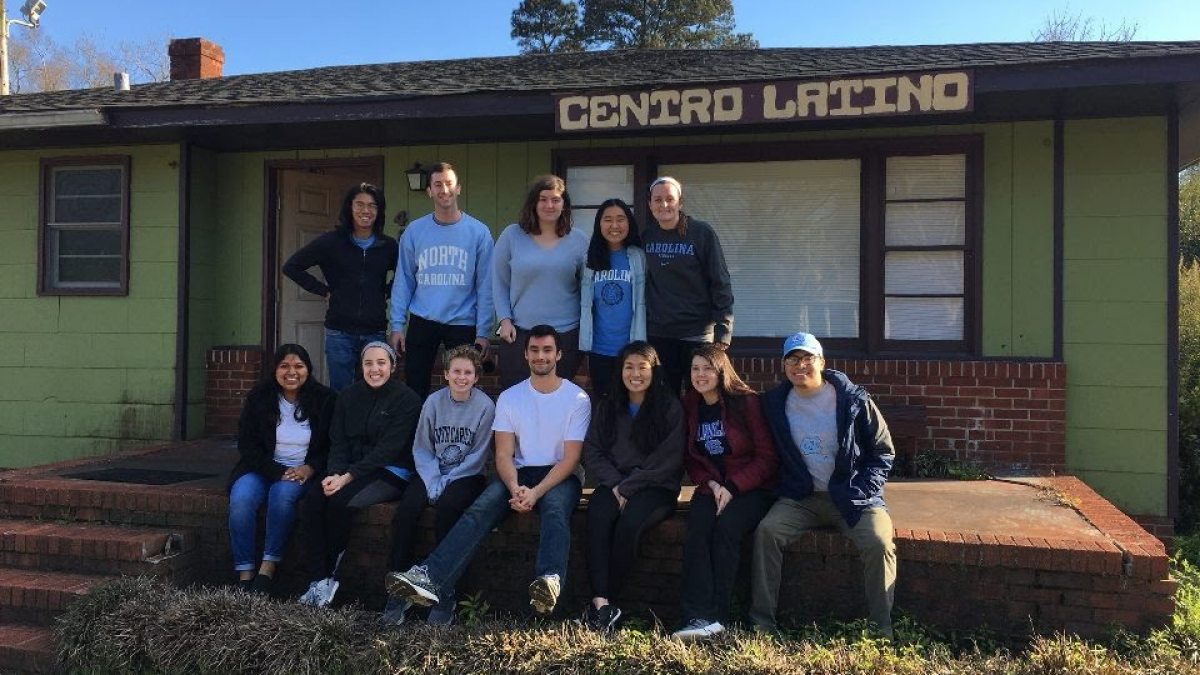Serving Latinx communities
Students from the Carolina Center for Public Service’s APPLES Service-Learning program spent their spring break in various communities around the country to see firsthand the range of issues impacting citizens.

As a Latina, leading the APPLES Service-Learning Alternative Spring Break: Latinx Communities was very important to me. I wanted the trip to encompass many Latinx communities, including those in urban areas, not just the usual presentation of Latinx communities as farmworkers.
For this trip, I traveled with my co-leader and 10 other participants to the North Carolina cities of Durham, Charlotte, Burgaw, Rocky Point, Atkinson, Wilmington, Raleigh and Dunn.
We learned about Latinx people who work in many sectors, such as business, construction, restaurants and contract work. We also learned about nonprofit organizations available in the area to help them.
While many Latinx communities face certain similar issues, there are many issues that arise depending on what kind of environment they are living in.
Organizations such as El Pueblo in Raleigh, Latin American Coalition in Charlotte and Amigos International in Wilmington are nonprofit organizations that offer immigration services, English classes, job-employment, Know Your Rights workshops, cultural festivals and so much more. Other organizations include Pender County Farmworker Health Program in Atkinson, Pender Christian Services in Burgaw, Episcopal Farmworkers Ministry in Dunn, which help the Latinx communities in rural North Carolina by providing immigration services and access to food and health services.
Working with these nonprofits, the Latinx trip gave hundreds of service hours to cities across North Carolina.
Our group created brochures for farmworkers and painted new workspaces for the Pender County Farmworker Health Program; organized the El Camino Community Center’s food pantry; cleaned and organized the entire facility of Pender Christian Services; created intake folders for immigration legal clinics at the Latin American Coalition; discussed the benefits of college with Latinx high school students in Pender County; and organized classrooms and workspaces for St. Martin’s Migrant Head Start.
We learned about day laborers, rights of farmworkers, the different types of farmworkers, legal cases involving the agribusiness and farmworkers, the state of DACA, Latinxs in business, Latinxs in the New South, the Latinx youth and their education, and the unification of all Latinos through cultural festivals.
All APPLES alternative spring break experiences have a class component that guides participants in understanding the work they will do in the communities — how every member of a community can be seen as an asset in their own way. We were able to see that in these communities, from the nonprofit organizations we visited to area businesses to the schools we visited.
Not only was I able to show other Carolina students the reality of the lives of Latinx communities as I led this alternative spring break, but the trip itself was also a re-affirmation for me.
I know I want to make a career out of aiding the Latinx community as much as possible. To be able to show the Latinx population in the New South was a life-changing experience because I was able to apply what I have learned in the classroom about Latinx communities to actual places and people for one week. I am very proud to have led this alternative break trip.




